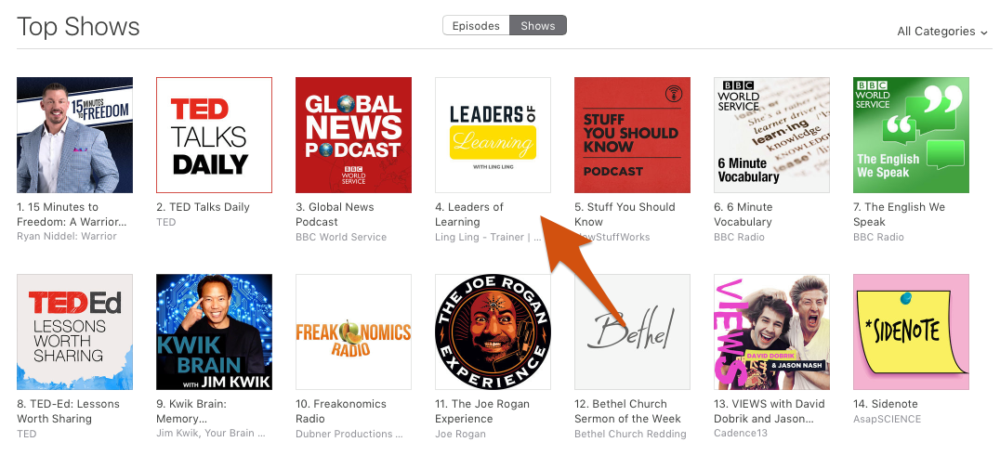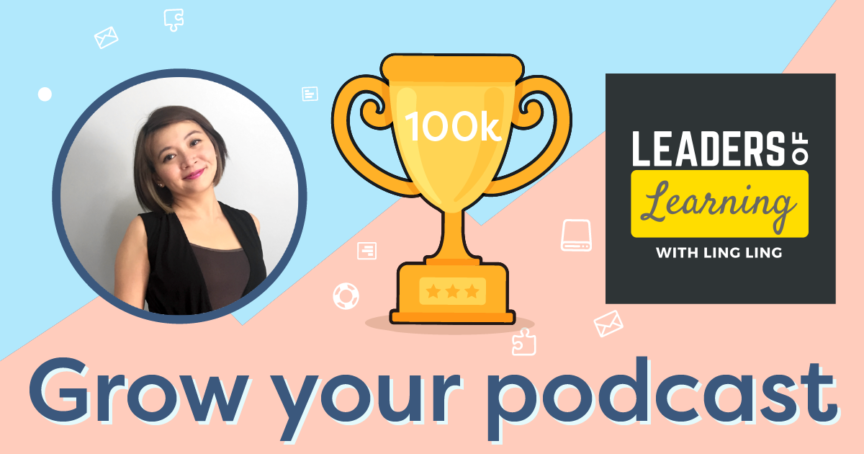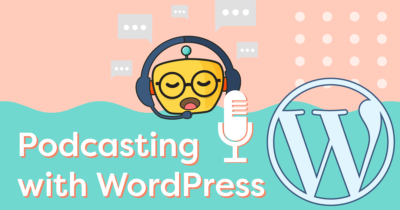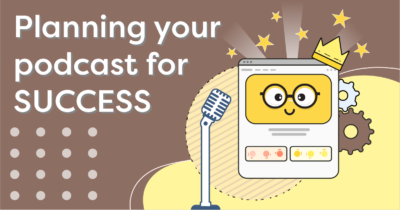You’ve started podcasting with WordPress, but how to grow your podcast listeners? Self-taught podcaster Ling Ling shares how she grew the Leaders of Learning podcast to over 100K downloads in its first year. Read all our articles about podcasting.
You started your podcast, and you’re ready to release new episodes. But how do you grow it over time?
If we compare with popular podcasts, it’s hard to relate: they have so many unique downloads, tons of reviews, and years of content.
What about when we’re just starting?

This was what Ling Ling Tai had to figure out when she started the Leaders of Learning podcast, the show where she explores learning in the 21st century with educators, leaders and entrepreneurs. As a result, Leaders of Learning was downloaded 100k times in its first year, with listeners in over 130 countries globally. Having finished Season 2 recently, she’s on the way to starting Season 3 with A-list guests such as GaryVee and many others!
I had the chance to interview her over the phone and ask (with great enthusiasm!) how she made it to this stage. Let’s take a look and learn!
In the beginning…
A seasoned learning and development professional (over 13 years!), Ling Ling resigned from the corporate world to start her own business venture:
CultureSpark a learning and development company that offers programs, profiles and coaching on intercultural communication, cultural intelligence, building virtual teams and many more.
But this was her first time starting off her own business, after being in the corporate world for so long. Not only that, a business survives on cash flow, and that means marketing out to potential prospects! Where can we learn about business, marketing and entrepreneurship? Podcasts, of course!
For reference, she listened to these podcasts to learn about business-modeling, marketing and how to create her own financial independence:
- John Lee Dumas’s Entrepreneur on Fire
- Side Hustle School by Chris Gillebeau
- The Tim Ferriss Show
- Freakonomics
- Infinite Monkey Cage (just because she loves science!)
But an idea came up: Ling is a fan of podcasts. She’s learning about business and marketing. She also wants to market her own business.
Why not start your own podcast to market your business?
Starting from zero, just like every beginner podcaster
After watching John Lee Dumas’ webinar on podcasting, she launched her podcast and learned on the go.
When she started hers, she set a high benchmark by making the standards the same as the above names. The mindset helps a lot with making sure your podcast has a great standard of quality before launching.
For the first season, Ling Ling started off with 12 full episodes, with 7 episodes pre-recorded and primed for release over the course of the season, all done on her own! In the beginning, she was still learning about audio production, so her first episode took 3 days to edit. Over time though, she became much more efficient and now can prep an episode within a day. Today, she also relies on freelancers for audio editing and copywriting to help her focus on tasks much more valuable to her time: her business, and interviewing guests.
Growing a podcast to 100k downloads
With grit and grind, Ling Ling achieved enviable success with her podcast.
- Leaders of Learning was featured on the iTunes Podcast Chart! The show has reached No. 1 in Vietnam, Cambodia, Laos, Indonesia, Malaysia and Sri Lanka; No. 2 in Singapore and the Philippines.
- The podcast show was also featured on Castbox in Malaysia, Singapore, India and Australia.
- Through her hustling, the podcast achieved 100k+ downloads in 10 months!
Throughout these two seasons, let’s see how she grew her podcast audience:
1. Share your podcast strategically
Organic listeners are the core to a growing podcast.
In the beginning, Ling shared her episodes on all relevant social media: Facebook, Twitter, and LinkedIn. Starting off with friends and family, colleagues, co-workers and those in the same field of interest, her immediate proximity was the first to hear about what she’s been working on.
This is a great start to a new podcast, because your immediate circle has the highest chance of finding your most organic listeners: those who really do support what you’re doing.
If they’re in your industry, they may like what you’re interested in. If they’re close to you, they’ll listen and support your endeavours.
2. Getting listed in podcast directories
Where can you share your podcast, beyond your immediate proximity? Directories and aggregates!
First, the podcast episodes themselves were hosted on Libsyn’s rock-solid podcast hosting. This ensures that downloads are fast and more importantly, reliable.
Next, Leaders of Learning was distributed from Libsyn to various platforms, including Spotify, Apple Podcasts, Google Podcasts, YouTube, Castbox, Stitcher and many others.
Being on as many platforms as possible means greater avenues for potential listeners to stumble upon the podcast! In particular, Castbox the audio aggregate platform is good for finding discussions on the podcast. Spotify is also on the rise, as it’s an easy way to introduce someone to podcasts.
So! While you’re setting up your padcast show, take the time to apply for other platforms! Over time, you’ll tap into their listener base, and that’s always a good thing 🙂
But let’s talk about the one that stands out the most:
The Power of Apple Podcasts
Apple Podcasts (formerly the iTunes Podcast Directory) is a beast when it comes to marketing and growing your podcast.
The Apple ecosystem is one of the strongest and most effective systems to market anything. For example, if you’re an artist, having your music accessible on iTunes is a great deal marketing-wise. It’s the same for podcasts!
For podcasts to thrive, you will need a combination of the following factors:
- Effective SEO and using relevant keywords in the podcast description
- Downloads, both unique and recurring
- New subscribers
A combination of all of that creates activity that influences your podcast’s value in the Apple ecosystem, driving up its rankings. When your rankings are on the verge of moving up/down, it affects their standing in different categories (ie. What’s hot, new and noteworthy, etc.).

Ling Ling was able to maximise her efforts on these factors and stayed on all the important categories! While other podcasts stayed on the ‘Top Shows’ and ‘New and Noteworthy’ categories for 2-4 weeks on average, Leaders of Learning stayed on them for a whole year!
This meant constant, front-page impressions for her podcast to any unsuspecting podcast listener!
Over time, this could have been one of the factors that led to unique downloads steadily towards the end of each season, which is of course a huge win for Ling!
3. Launch with a bang
It’s always good practice to launch with a bang! ?
By batch recording episodes beforehand and launching the show with 3-5 episodes immediately, we can retain first-time listeners who try out new shows through the first few listens.
This was what Ling Ling did:
- On January 2018, launched Leaders of Learning Season 1 with 3 episodes
- The first season was planned with up to 15 audio pieces, which include episodes, teasers, recaps, etc.
- 7 Episodes were already pre-recorded and in the backlog!
With this, she is able to retain listeners who stumble into her podcast, as well as keep up with her determined release schedule. Consistency is key!
Asia’s very first
virtual Podcast Summit
Nov 9–10, 2019
4. Build the hype around each episode
When releasing any piece of content, it’s always good to build the hype around it. Ling uses a 3-phase approach to promoting each episode.
Pre-release Marketing

This is where you create anticipation. Ling Ling would release updates on who the upcoming guest is, what the episode will be about, and priming podcast listeners on what they will hear! So, for you, it would be posts on:
- Release date of the upcoming episode
- Where can we listen to it
- What will the theme be about?
- Who is the guest?
- Sneak peeks?
Release Marketing

This is when you release new pieces of content that coincide with the release of the new episode. This includes content that is posted a few days after release too!
Examples include the following:
- Announce on social media that the episode is released. Be sure to include an episode summary and brief profile of your interviewee
- Have a direct link so listeners can consume it through their favourite app
- Post audio snippets from interesting segments in the episode to promote it further
Post-release/Recap Marketing

This consists of content that’s repurposed a while after the episode is released. Usually this promotion is scheduled a week after, normally coinciding with the next episode’s release.
If you can find memorable quotes, useful insights, and anything that is evergreen from your podcast, these can be repurposed and re-used over again. Some of the content from your Release Marketing phase can apply here too!
This all works really well with GaryVee’s content pyramid, which you can check out here.
5. Marketing your podcast in events!
According to Ling one of the most unconventional yet effective method to grow a podcast is showing up to events and talking about it!
People put a lot of social proof to the word podcasts: having one under your name gives you a unique advantage over those in the same field who don’t have one. To Ling Ling, this is a huge opportunity:
She would go to networking events and call herself a podcaster, being proactive in discussions and informing those around her about what she does. Standing out, asking questions, giving back value: we tend to base the value someone gives by their experiences and career. If we associate that with our podcast show, people are much more inclined to find out more about it! Plus, Podcast hosts are few and far in between, so the fact that podcasters stand out is awesome!
Later on, people would approach her and ask about the show. This was where the goldmine is: directing people to where they can listen to your show in person is advantageous. For a listener, nothing beats listening to a show once you’ve met the face behind the voice 🙂
And remember:
Be proud that you’re a podcaster, and tell everyone that you are.
Ling Ling, host of Leaders of Learning
6. Marketing through guests!
I asked Ling Ling about marketing through guests: is there a right way to do it? Is it bad to ask?
In her experience, you can’t control what your guests do with your episode: some share it once and move on, and others downright ignore it. You can encourage them to share it with their network, but that’s the extent of it.
For Leaders of Learning, it’s less to do with the branding of the guests, and more about what they do with the episodes themselves. The episodes that had spikes in organic downloads came from guests that have the following traits:
- A large following
- Willing to actively share the episode to their following
- Encouraged their following to listen
- The followers are die-hard fans of the guest
Once again, you can encourage but not force your guests to talk about the podcast. It’s never a good thing to make our relationships transactional after all!
7. Be part of the podcasting community
One important thing about being a podcaster is having a podcast community around you. It’s like joining a support group, you can hang out with people who:
- Understand the struggles of podcasting
- Are confirmed podcast listeners
- May give you more podcasting opportunities!
In Ling Ling’s case, she stumbled upon the SG Podcasting Community, a Facebook Group of fellow podcasting enthusiasts who talk about all things podcasting! They have bi-monthly meetups where they would hang out (*cough* drink *cough*), share their knowledge and even ask each other to guest on shows! These are some of her guest appearances:
- Discover and Learn with Ling Ling Tai – The Tao of Self Confidence
- Ling Ling talks about The Human Voice and Duolingo – Economical Rice Podcast
- Questioning female leaders after Theranos – LongKang Kitties
This is just a rough list, there’s more here!
Cross promoting really helps with both shows: you’re sharing your listener base and spreading the love! Plus, your listeners don’t have to worry about being introduced to the show: they will follow your voice everywhere you go 🙂
Overall, it’s a win-win situation for podcast hosts and the podcasting community. Hosts help each other by guesting, creating content, and contributing to the overall skill level of the community! The more buzz happens around the community, the more followers it’ll gain over time!
Basically: being a podcast guest and sharing podcast tips and tricks is super effective!
What were some of the struggles growing the podcast?
“Time and limited resources,” said Ling Ling. “It was difficult to dedicate time to the podcast if there is no revenue, and vice versa.”
As her podcast was a way to market CultureSpark, Ling had to balance between running a business and running the podcast. There wasn’t exactly any revenue being generated from producing an episode for example, so it was more of figuring out how to spend your earning hours.
It’s important to determine the tasks that you are responsible for in building a podcast. To give you a quick overview, here is an example of Ling Ling’s workflow:
Consistency is key
- Planning a season’s worth of episodes and themes
- Drafting a podcast brief
- Sourcing for guests + guest outreach
- Interviewing the guest
- Audio production, editing
- Source for music licenses (if necessary)
- Show notes, transcription of the episode
- Pre-release, release, post-release marketing creation
- Marketing management
One thing that stands out to me is how well-organized Ling Ling is. She plans all the pieces she needs to record (episodes, teasers, recaps, etc) which she then edits together for a really professional production.
Questions to ask yourself: In which part of the workflow do you thrive the most? Which parts are you weak at? Should you outsource them? Do you need more time for some of the tasks, like guest outreach?
Podcasting is a huge commitment, so it’s good to clearly assign roles to your team, or schedule your time accordingly to do all of them on your own!
In terms of finding guests, it wasn’t that difficult as the theme of her podcast is centered around a specific niche. It then became a matter of tapping into the network where all the potential guests could be, and as a seasoned professional in her niche, Ling Ling has it going there.
For those budding podcasters who may have multiple themes, you might get ‘guest overload’ when planning out your episodes: you don’t want too many guests talking about the exact same topic consecutively. A little bit of variety and narrative in the field keeps the listeners going after all!
As long as you have the time and know how to manage your single most important resource well, it’s all good 🙂
What’s happening down the road for Ling Ling?
There were tons of opportunities that came by ever since Leaders of Learning was released!
One amazing thing that happened was that Ling got a 15 minute interview with Gary Vee! Check out the full interview here:
At the time of writing, she has just kicked off Season 3! The first episodes are just being released, but Ling has already lined up all the guests for the season and outlined all the content (props for preparation!). Helping with both CultureSpark and production of the podcast is her new Virtual Assistant! It’s a sign of great growth 🙂
Remember when Ling Ling would meet up with others in networking events who are interested in diving into the world of podcasting? She’s started a new company to help educate users on how to start their own podcast, as well as consult them too! Her goal is “to build a podcasting landscape where it’s democratic, where you can get your voice out, and not have it changed by anyone.” What an awesome goal! Want to learn how to start your own podcast? Be sure to checkout Meavox Live.
Some Final questions
Finally, I asked her this:
What are the biggest factors of growth for a podcast?
Her answers were:
- Content, if it’s not relevant then it’s listeners will drop off. Even if it’s pretty, high quality audio, if the content is not high quality then it’s not worth it
- Consistency, making sure that you’re on a regular release schedule. Your loyal followers are waiting to hear you again!
- ALSO, transparency. If it’s seasonal, you have to let your listeners know when you’ll take a break, when you’re coming back, etc.
And of course, as a budding podcaster myself, I asked:
Any advice for podcasters wanting to grow their own podcast?
Her answer? Just launch it.
“One of the biggest stumbling blocks is fear of failure, and needing to be perfect, and that delays the process.” She said. “It is a journey, not a destination. As you go through the journey, you make changes to the podcast, the structure of the episode, and much more. You have to see as a journey not as a goal. It’ll evolve. Just launch, learn from it, and evolve.”
And on that note, we’d like to say thanks to Ling Ling for taking time to share her tips and strategies with us. You’re a real inspiration!
P.S. Did you enjoy the article? Share this article and say hi to @linglingtai on Twitter. And don’t forget to tune in to Leaders of Learning!





thank you clickwp for giving me wonderful information